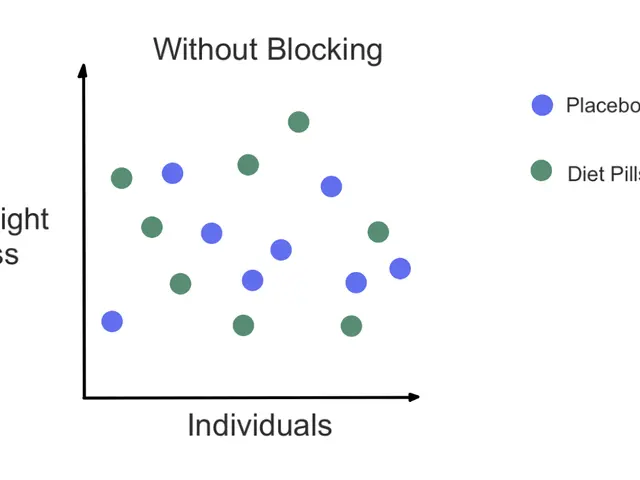Possible Study Suggests GLP-1 Drugs like Ozempic May Offer Benefits for Migraine Treatment
In a groundbreaking development for chronic migraine patients, particularly those with obesity, a new treatment option is emerging on the horizon. Recent studies have indicated that GLP-1 therapies, such as liraglutide, could potentially provide an additional avenue for treatment for those who have not responded to other medications [1].
These findings, published this month in the journal Headache, suggest that liraglutide, an older GLP-1 drug, could significantly reduce migraine episodes for individuals with obesity (BMI over 30) and chronic migraines. In a 12-week trial involving 31 patients, participants experienced a substantial drop in the number of migraine days each month [4]. On average, their migraine days decreased from around 20 days to just under 11 — a nearly 50% drop [4]. One participant even became completely free of migraines [4].
The study, conducted by researchers at the University of Naples Federico II, implies that liraglutide's effect on migraines appears to be independent of its weight loss effect [1][3]. This is significant because the improvements occurred despite minimal changes in body weight [1][3].
The proposed mechanism behind this potential breakthrough relates to liraglutide’s ability to reduce intracranial pressure (ICP), a factor believed to be a migraine trigger [2][4]. GLP-1 receptor agonists like liraglutide reduce cerebrospinal fluid secretion by acting on the choroid plexus, lowering ICP and possibly decreasing migraine-associated molecules such as CGRP, which plays a key role in migraine pain pathways [2][4]. However, direct measurements of ICP reduction in migraine patients are still needed to confirm the mechanism [2][4].
While these findings are promising, they are preliminary, and larger controlled studies are required before GLP-1 therapies can be routinely recommended for migraine treatment [1][2][4]. Nevertheless, experts view these results as a *new pathway for migraine relief*, especially for patients with obesity and intractable migraines who do not respond well to existing therapies [1].
Moreover, the researchers question whether newer GLP-1 drugs like semaglutide (Ozempic and Wegovy) could be more effective at relieving pressure-related migraines [1]. If validated by more studies, these findings could potentially provide a new and already tested avenue for treating difficult migraine cases.
It is worth noting that GLP-1s mimic a hormone important to regulating hunger and metabolism [5]. Some early studies have suggested GLP-1s can tamp down the drug-related cravings of people with substance use disorders [6]. The latest approved iterations of GLP-1s, semaglutide and tirzepatide, are substantially more effective at helping people lose weight and control their blood sugar than diet and exercise alone [6].
In summary, liraglutide and other GLP-1 receptor agonists show potential as an additional treatment option for chronic migraine patients with obesity, offering significant reduction in migraine days likely through mechanisms beyond weight loss. However, more research is needed to validate these findings and clarify the exact therapeutic pathways [1][2][3][4]. This new development in migraine treatment offers a glimmer of hope for those suffering from chronic migraines, particularly for those who have not responded to other medications.
- The emerging treatment option for chronic migraine patients, particularly those with obesity, is the GLP-1 therapy liraglutide.
- In a study by the University of Naples Federico II, liraglutide showed promising results in reducing migraine episodes for individuals with obesity and chronic migraines.
- The study suggested that liraglutide's effect on migraines appears to be independent of its weight loss effect, implying improvements may occur even with minimal changes in body weight.
- The proposed mechanism behind liraglutide's potential benefits for migraine patients involves its ability to reduce intracranial pressure, a factor believed to be a migraine trigger.
- If further studies confirm these findings, newer GLP-1 drugs like semaglutide could potentially be more effective at relieving pressure-related migraines.
- Apart from its potential impact on migraine treatment, GLP-1s are also known to mimic a hormone important for regulating hunger and metabolism, and have shown potential in addressing drug-related cravings and weight management.





